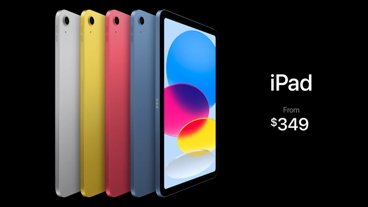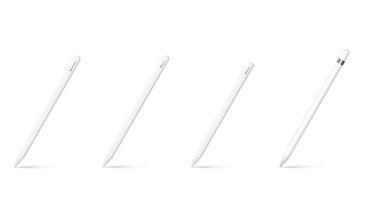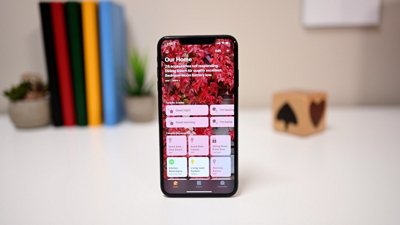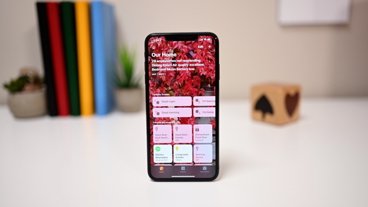Apple targets Google's mobile ads market with Quattro acquisition
Google's Android has been viewed as a direct competitor to Apple's iPhone, even before the company officially released the details of its mobile strategy. Many originally even expected Google to launch its own hardware, rather than just partnering with other manufacturers as a software licensor and reseller. But few have recognized the potential for Apple to take on Google's virtual monopoly in online advertising and leverage its position with the iPhone and iTunes to rival Google as an ad broker.
To many observers, Google was simply destined to play the role of Microsoft in the 1990s, swooping in to remove Apple's unique product and replace it with a commodity device running a broadly licensed operating system. Since the release of the first Android phone in October 2008 however, Android hasn't come anywhere close to taking on Apple's hardware business or assembling a similar ecosystem of third party development. Instead, it has largely gobbled up Microsoft's stagnant Windows Mobile market share.
Google's Android strategy
Google's Android project developed years before Apple released the iPhone; it was originally aimed directly at Windows Mobile, not to sell hardware but to keep Google a viable contender in the mobile advertising space. Google had no reason to compete directly with Apple even after the iPhone's launch, because Apple's smartphone already used Google for its web search, maps, and other online services.
With Apple playing no role in online advertising, Google remained focused on creating an open source smartphone monoculture that would allow it to track and target mobile users with advertising. Google hoped its new operating system would largely be developed and managed by the community, and that third party hardware developers would take over the details of building handsets.
This strategy was expected to enable Google to simply expand its advertising monopoly into mobile devices and become the next Microsoft of smartphones, except that it would be collecting revenues for ads and paid search results rather than licensing software as Microsoft had.
Apple signals an intent to join the ad market
Shortly after Google acquired AdMob for $750 million to expand its mobile ads expertise last fall, it was discovered that Apple had also bid on the company.
Earlier this month, Apple acquired Quattro Wireless for a reported $275 million. While that acquisition is smaller, Apple also has a rich repository of information on its 500 million iTunes users that Google can't access.
Apple also has a tight relationship with its iPhone developers, who can only publish their apps through iTunes. By offering its developers integrated advertising services, Apple can get started in the mobile ad business and quickly catch up with Google's own fledgeling mobile efforts.
When asked about the company's recent acquisitions of Quattro and Lala after yesterday's earnings report, Apple's chief financial officer Peter Openheimer answered, "In terms of Quattro and Lala we acquired Quattro because we wanted to offer a seamless way for developers to make more money on their apps, especially free apps. We acquire companies from time to time for their technology and talent, that's why we do it."
Apple has never run an ad business before, but it has also never really had a captive platform to sell any advertising before either. The company briefly flirted with adding banner ads to its Sherlock search app a decade ago before abandoning the idea. Since then, it has focused on selling its own applications and its iTunes media partners' content as ad-free rather than chasing the idea of ad-supported media models as Google, Hulu, and Microsoft have been experimenting with recently.
Paid vs. free (with ads)
Microsoft in particular has worked to develop ad-supported, online versions of its Office suite to compete against Google's comparable offerings, as well as mobile games for its Zune HD device which are intended to be subsidized by ads.
However, even with iPhone apps, Apple has worked to encourage its developers to charge very little and profit in volume rather than give their apps away and try to monetize them with ads. By leveraging its Quattro acquisition, Apple appears ready to augment its favored, paid iPhone app model with options for developers that allow them to earn revenues on free apps.
Apple may also leverage its new mobile ad savvy to subsidize new video and multimedia content for its upcoming tablet product, although it's also likely that the company will continue to push its micropayment model that has proven to be wildly successful on the iPhone and iPod touch and throughout iTunes in general.
 Prince McLean
Prince McLean












 Mike Wuerthele
Mike Wuerthele
 Malcolm Owen
Malcolm Owen
 William Gallagher
William Gallagher
 Andrew O'Hara
Andrew O'Hara












9 Comments
Meanwhile Google struck back this morning and released a web based version of Google Voice for the iPhone.
Not meaning to thread jack, it's a very popular feature, so it's all here for those interested, until AI comes out with their own article ; - )
http://forums.appleinsider.com/showthread.php?t=106523
<end jack>
But you really did mean to thread jack didn't you?
Apple has signaled a clear intent to muscle its way into the mobile ad market using its recent acquisition of Quattro, a direct challenge to Google's Android-related ventures.
[ View this article at AppleInsider.com ]
I personally hate the ad supported apps. I hope Apple can find some way to make the ads less annoying.
I can see the reason for doing them with Lite versions. I assume that there must be a fair bit of revenue to be made by doing ad supported app vrs paid (especially if recent piracy articles are to be believed) since some outfits continue to use this model.
Does anyone have any numbers for ad supported apps (ideally has an app on iTunes App Store)? Can anyone quote some real revenue numbers and give some sort of idea of what it takes to use this model (very rough implementation/maintenance details)?
... Paid vs. free (with ads) ...
I just hope that the developers out there realise that there is a big difference between "free" and "free with ads," and that by only going with the ad supported model of development they are literally leaving a big chunk of potential users out of their calculations.
A lot of people just don't like advertising and go out of their way to avoid it, Mac users especially. Personally, I think people should just stop using the word "free" in regards these apps. They aren't free, and they aren't fooling anyone.
I'm sure will ad a very simple mechanism for adding an ad to any app, but I wonder if they'll make the ads arequirement for free apps (even if just a splash screen) to capitalize on the expense they may incur for the excessive amount of free apps they offer. I know I have hundreds of free apps, most of which I have used only once, yet I still get the updates from the App Store. I doubt they go that route, but a the same time wonder put past them.